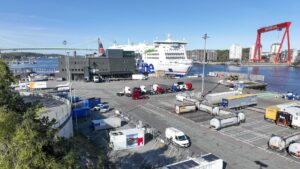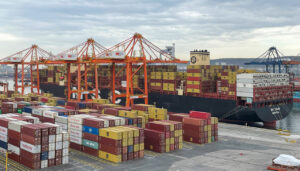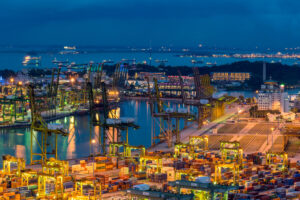Incoming Carbon Intensity Indicator (CII) regulations for the shipping industry could reduce container vessel capacity by up to 10 per cent, according to one of the world’s largest shipping providers.
The CII rating scheme, set to come into force next year, will assign different ratings to vessels based on their efficiency ratio; taking into account travelling distance, speed, and how often the vessel is utilised in a carrier’s fleet.
Ships are rated from A to E based on their energy efficiency over a one-year stretch, with evaluations beginning in 2023.
Vessel owners must produce a Ship Energy Efficiency Management Plan Part III (SEEMP Part III), outlining how they will comply with CII regulation.
Many across industry have criticised the plans however, noting that the CII regulations fail to take into account wider factors including short notice in preparing the plans, and external impacts on a ship’s performance such as congestion in ports.
In a 31 October statement, Mediterranean Shipping Company (MSC) spokesperson Giles Broom wrote that whilst MSC will support and comply with the CII regulation, the company has called for reassessment of the calculation methodology of a ship’s performance.
“Based on estimates, CII is expected to absorb about 7-10 per cent of capacity across the global container fleet [i.e. across multiple shipping lines] as vessels are deployed to meet both the needs of customers and the required CII standards,” MSC’s Broom wrote.
READ: UK shipping industry demands net-zero by 2050
“As many across academia and industry have said, the calculation methodology (AER/DWT) should be revised to avoid unintended consequences that would distort the performance of a ship that spends a lot of time in port.
“As things stand, the proposed methodology could lead to situations in which a vessel’s rating would worsen simply because it spends more time in port. We respectfully question whether this unintended consequence could be avoided by amending the methodology.”
CII should not effectively penalise vessels trading on shorter distances and while waiting alongside, Broom wrote.
“It would be far better to have an operational indicator that would reward more productive ships, including based on cargo carried rather than on a theoretical value that may not correlate to transport work performed.”
MSC will continue to harness the latest ship design and technologies to modernise its fleet, by retrofitting older vessels and incorporating new buildings that include the world’s largest and most energy-efficient container ships.
On top of a range of design and technology efficiency measures, the MSC spokesperson said that it will not be possible to achieve the required standards without a new programme of voyage optimisation that includes elements such as speed reductions and injecting additional ships into the network.
Just-in-time port call optimisation will also play a role in reducing emissions, Broom wrote.








